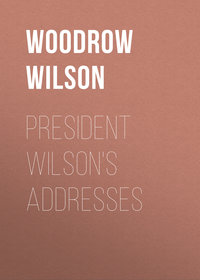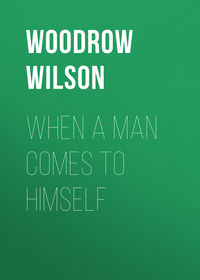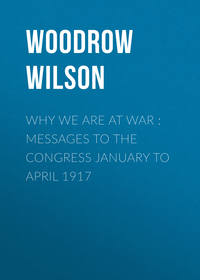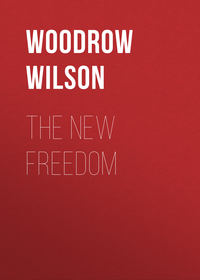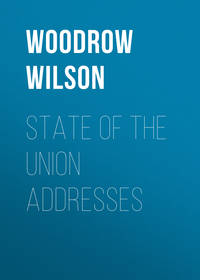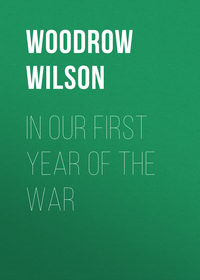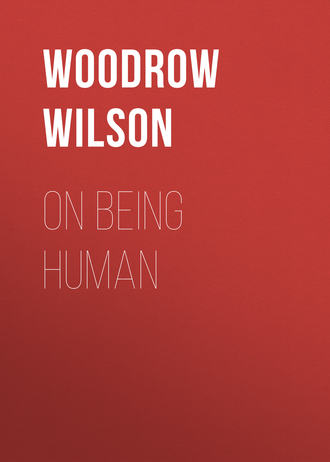 полная версия
полная версияOn Being Human
That man seems to me a little less than human who lives as if our life in the world were but just begun, thinking only of the things of sense, reckoning nothing of the infinite thronging and assemblage of affairs the great stage over, or of the old wisdom that has ruled the world. That is, if he have the choice. Great masses of our fellow-men are shut out from choosing, by reason of absorbing toil, and it is part of the enlightenment of our age that our understandings are being opened to the workingman’s need of a little leisure wherein to look about him and clear his vision of the dust of the workshop. We know that there is a drudgery which is inhuman, let it but encompass the whole life, with only heavy sleep between task and task. We know that those who are so bound can have no freedom to be men, that their very spirits are in bondage. It is part of our philanthropy—it should be part of our statesmanship—to ease the burden as we can, and enfranchise those who spend and are spent for the sustenance of the race. But what shall we say of those who are free and yet choose littleness and bondage, or of those who, though they might see the whole face of society, nevertheless choose to spend all a life’s space poring upon some single vice or blemish? I would not for the world discredit any sort of philanthropy except the small and churlish sort which seeks to reform by nagging—the sort which exaggerates petty vices into great ones, and runs atilt against windmills, while everywhere colossal shams and abuses go unexposed, unrebuked. Is it because we are better at being common scolds than at being wise advisers that we prefer little reforms to big ones? Are we to allow the poor personal habits of other people to absorb and quite use up all our fine indignation? It will be a bad day for society when sentimentalists are encouraged to suggest all the measures that shall be taken for the betterment of the race. I, for one, sometimes sigh for the generation of “leading people” and of good people who shall see things steadily and see them whole; who shall show a handsome justness and a large sanity of view, an opportune tolerance for details, that happen to be awry, in order that they may spend their energy, not without self-possession, in some generous mission which shall make right principles shine upon the people’s life. They would bring with them an age of large moralities, a spacious time, a day of vision.
Knowledge has come into the world in vain if it is not to emancipate those who may have it from narrowness, censoriousness, fussiness, an intemperate zeal for petty things. It would be a most pleasant, a truly humane world, would we but open our ears with a more generous welcome to the clear voices that ring in those writings upon life and affairs which mankind has chosen to keep. Not many splenetic books, not many intemperate, not many bigoted, have kept men’s confidence; and the mind that is impatient, or intolerant, or hoodwinked, or shut in to a petty view shall have no part in carrying men forward to a true humanity, shall never stand as examples of the true humankind. What is truly human has always upon it the broad light of what is genial, fit to support life, cordial, and of a catholic spirit of helpfulness. Your true human being has eyes and keeps his balance in the world; deems nothing uninteresting that comes from life; clarifies his vision and gives health to his eyes by using them upon things near and things far. The brute beast has but a single neighborhood, a single, narrow round of existence; the gain of being human accrues in the choice of change and variety and of experience far and wide, with all the world for stage—a stage set and appointed by this very art of choice—all future generations for witnesses and audience. When you talk with a man who has in his nature and acquirements that freedom from constraint which goes with the full franchise of humanity, he turns easily with topic to topic; does not fall silent or dull when you leave some single field of thought such as unwise men make a prison of. The men who will not be broken from a little set of subjects, who talk earnestly, hotly, with a sort of fierceness, of certain special schemes of conduct, and look coldly upon everything else, render you infinitely uneasy, as if there were in them a force abnormal and which rocked toward an upset of the mind; but from the man whose interest swings from thought to thought with the zest and poise and pleasure of the old traveler, eager for what is new, glad to look again upon what is old, you come away with faculties warmed and heartened—with the feeling of having been comrade for a little with a genuine human being. It is a large world and a round world, and men grow human by seeing all its play of force and folly.
VI
Let no one suppose that efficiency is lost by such breadth and catholicity of view. We deceive ourselves with instances, look at sharp crises in the world’s affairs, and imagine that intense and narrow men have made history for us. Poise, balance, a nice and equable exercise of force, are not, it is true, the things the world ordinarily seeks for or most applauds in its heroes. It is apt to esteem that man most human who has his qualities in a certain exaggeration, whose courage is passionate, whose generosity is without deliberation, whose just action is without premeditation, whose spirit runs toward its favorite objects with an infectious and reckless ardor, whose wisdom is no child of slow prudence. We love Achilles more than Diomedes, and Ulysses not at all. But these are standards left over from a ruder state of society: we should have passed by this time the Homeric stage of mind—should have heroes suited to our age. Nay, we have erected different standards, and do make a different choice, when we see in any man fulfillment of our real ideals. Let a modern instance serve as test. Could any man hesitate to say that Abraham Lincoln was more human than William Lloyd Garrison? Does not every one know that it was the practical Free-Soilers who made emancipation possible, and not the hot, impracticable Abolitionists; that the country was infinitely more moved by Lincoln’s temperate sagacity than by any man’s enthusiasm, instinctively trusted the man who saw the whole situation and kept his balance, instinctively held off from those who refused to see more than one thing? We know how serviceable the intense and headlong agitator was in bringing to their feet men fit for action; but we feel uneasy while he lives, and vouchsafe him our full sympathy only when he is dead. We know that the genial forces of nature which work daily, equably, and without violence are infinitely more serviceable, infinitely more admirable, than the rude violence of the storm, however necessary or excellent the purification it may have wrought. Should we seek to name the most human man among those who led the nation to its struggle with slavery, and yet was no statesmen, we should, of course, name Lowell. We know that his humor went further than any man’s passion toward setting tolerant men atingle with the new impulses of the day. We naturally hold back from those who are intemperate and can never stop to smile, and are deeply reassured to see a twinkle in a reformer’s eye. We are glad to see earnest men laugh. It breaks the strain. If it be wholesome laughter, it dispels all suspicion of spite, and is like the gleam of light upon running water, lifting sullen shadows, suggesting clear depths.
Surely it is this soundness of nature, this broad and genial quality, this full-blooded, full-orbed sanity of spirit, which gives the men we love that wide-eyed sympathy which gives hope and power to humanity, which gives range to every good quality and is so excellent a credential of genuine manhood. Let your life and your thought be narrow, and your sympathy will shrink to a like scale. It is a quality which follows the seeing mind afield, which waits on experience. It is not a mere sentiment. It goes not with pity so much as with a penetrative understanding of other men’s lives and hopes and temptations. Ignorance of these things makes it worthless. Its best tutors are observations and experience, and these serve only those who keep clear eyes and a wide field of vision. It is exercise and discipline upon such a scale, too, which strengthen, which for ordinary men come near to creating, that capacity to reason upon affairs and to plan for action which we always reckon upon finding in every man who has studied to perfect his native force. This new day in which we live cries a challenge to us. Steam and electricity have reduced nations to neighborhoods; have made travel pastime, and news a thing for everybody. Cheap printing has made knowledge a vulgar commodity. Our eyes look, almost without choice, upon the very world itself, and the word “human” is filled with new meaning. Our ideals broaden to suit the wide day in which we live. We crave, not cloistered virtue—it is impossible any longer to keep the cloister—but a robust spirit that shall take the air in the great world, know men in all their kinds, choose its way amid the bustle with all self-possession, with wise genuineness, in calmness, and yet with the quick eye of interest and the quick pulse of power. It is again a day for Shakespeare’s spirit—a day more various, more ardent, more provoking to valor and every large design, even than “the spacious times of great Elizabeth,” when all the world seemed new; and if we cannot find another bard, come out of a new Warwickshire, to hold once more the mirror up to nature, it will not be because the stage is not set for him. The time is such an one as he might rejoice to look upon; and if we would serve it as it should be served, we should seek to be human after his wide-eyed sort. The serenity of power; the naturalness that is nature’s poise and mark of genuineness; the unsleeping interest in all affairs, all fancies, all things believed or done; the catholic understanding, tolerance, enjoyment, of all classes and conditions of men; the conceiving imagination, the planning purpose, the creating thought, the wholesome, laughing humor, the quiet insight, the universal coinage of the brain—are not these the marvelous gifts and qualities we mark in Shakespeare when we call him the greatest among men? And shall not these rounded and perfect powers serve us as our ideal of what it is to be a finished human being?
We live for our own age—an age like Shakespeare’s, when an old world is passing away, a new world coming in—an age of new speculation and every new adventure of the mind; a full stage, an intricate plot, a universal play of passion, an outcome no man can foresee. It is to this world, this sweep of action, that our understandings must be stretched and fitted; it is in this age we must show our human quality. We must measure ourselves by the task, accept the pace set for us, make shift to know what we are about. How free and liberal should be the scale of our sympathy, how catholic our understanding of the world in which we live, how poised and masterful our action in the midst of so great affairs! We should school our ears to know the voices that are genuine, our thought to take the truth when it is spoken, our spirits to feel the zest of the day. It is within our choice to be with mean company or with great, to consort with the wise or with the foolish, now that the great world has spoken to us in the literature of all tongues and voices. The best selected human nature will tell in the making of the future, and the art of being human is the art of freedom and of force.
THE END1
From “Lines composed a few miles above Tintern Abbey,” by William Wordsworth.—J.M.
2
From “The Future,” by Matthew Arnold.—J.M.


